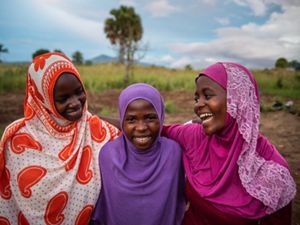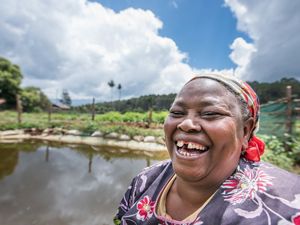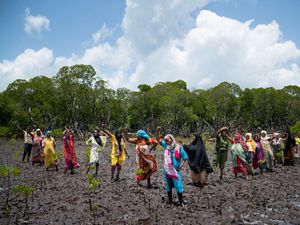Women at the Heart of Conservation and Culture in Tanzania
The Enaboishu Women's Trading Center is a vibrant hub for improved livelihoods and community development.
The Randilen Enaboishu Women's Trading Center in Tanzania, supported by The Nature Conservancy (TNC), Istituto Oikos, and the Randilen Wildlife Management Area (WMA), is more than just a marketplace. It serves as a vibrant hub for empowerment and cultural preservation, transforming local traditions into sustainable futures and fostering community development.
Nestled in the heart of Tanzania, the Randilen WMA is home to approximately 20,000 people, primarily from the Maa community. About 3,000 people reside in the eight villages that are directly involved with the center. The Enaboishu Women's Group, representing these villages, currently has 40 members who produce and sell a variety of traditional items, including honey, beads, sculptures, carvings, shukas (traditional Maasai garments often worn as wraps), calabashes (hollowed-out gourds used as containers), rungus (wooden clubs traditionally used by Maasai warriors), and fly whisks for swatting away insects.
The center’s work, ranging from intricate beadwork to spellbinding traditional dances, is not merely artistic expression, but a great statement of heritage preservation. Each product and performance is a thread in the fabric of their cultural identity, proudly shared with the world.

TNC’s engagement in the Randilen WMA is driven by the need to protect this unique ecosystem, which serves as a crucial habitat for a diverse range of wildlife, including elephants, lions, greater kudu, and African wild dogs. This landscape is part of the larger Tarangire-Manyara ecosystem, a vital corridor for wildlife movement between protected areas, supporting rich biodiversity that is under threat from habitat loss and fragmentation, poaching, and human settlement expansion. By collaborating with local communities and partner organizations, TNC aims to foster sustainable land use practices that align conservation efforts with community needs.
The women’s trading center was established to provide a platform for women and youth from the Randilen WMA to engage with and benefit from tourism opportunities. The aim is to diversify income streams through the promotion and sale of cultural products and experiences and to enhance community livelihoods within the Randilen WMA. Through TNC’s support, Oikos has provided training in sustainable, environmental-friendly micro-enterprises, marketplace literacy and village community banks, as well as hospitality and group leadership and management. Additionally, partnerships with local lodges to buy directly from the community were initated.
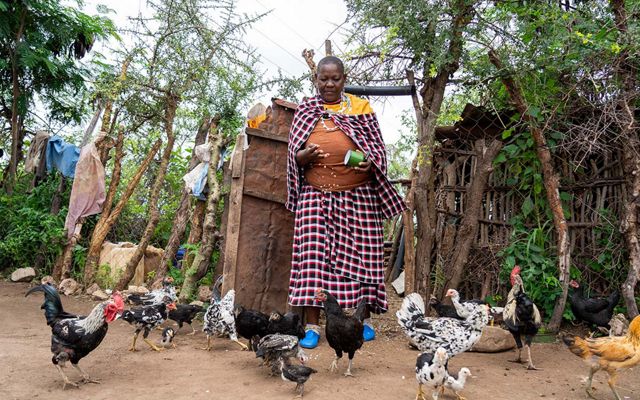
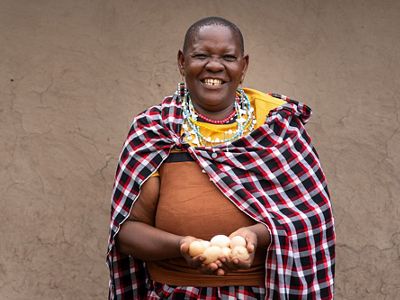
Ngoikishon Saigili, a 50-year-old mother of six from Naitolia Village, is a member of the Enaboishu Women’s Group. She says that the proceeds from the business and the microfinance group enterprise, which offers loans to members, have enabled her to educate her children and improve her home from a traditional grass-thatched house to a more modern, secure dwelling. Ngoikishon emphasizes that conserving the environment benefits the entire community. The education they have received has improved awareness that cutting down trees directly correlates with the drought conditions experienced in the past.
Quote: Ngoikishon Saigili
The patriarchy no longer exists. Right now I can stand in a meeting, speak, be heard, and my point will be worked on.

The Randilen Enaboishu Women’s Trading Center demonstrates how conservation can harmoniously coexist with cultural heritage and economic empowerment. It is a place where every handshake and smile offers a story, a lesson in the enduring power of community and conservation working as one. Visitors to the center are warmly welcomed and are offered a glimpse into the authentic rhythms of rural life.
There are currently two Women’s Trading Centers within Randilen, called Bomas, where women also engage in microfinance to build capital and self-empowerment. The enterprise aims to tap into the approximately 10,000 tourists who visit the Randilen landscape each year. The number of tourists is expected to increase by 10 percent annually, and the women aim to engage 20 to 30 percent of these visitors.
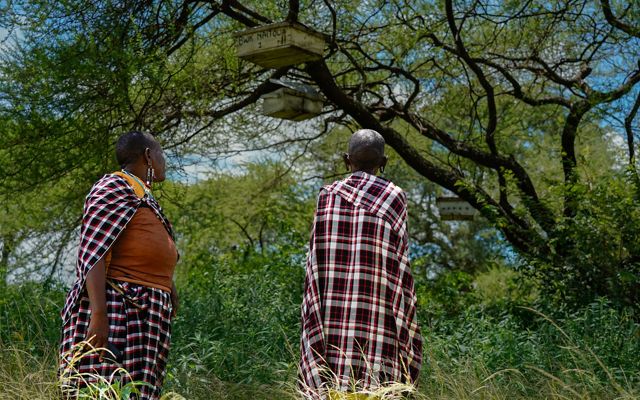
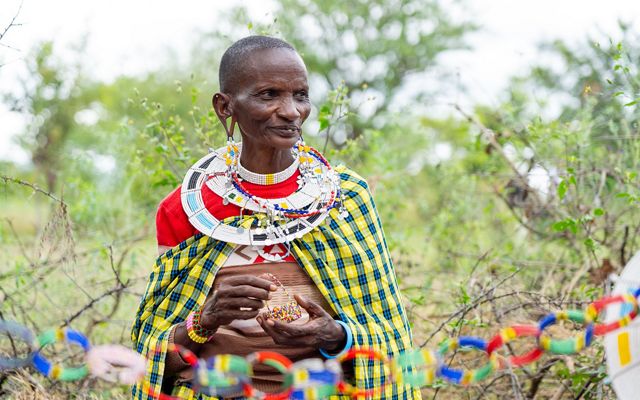
Ester Lemuwguloy, 53 years old, is a proud mother of seven and grandmother of 14. She specializes in beadwork, creating intricate necklaces known as shangas, and also excels in basketry, crafting traditional kikoba baskets. Ester spends five days a week at the Boma, a place designed to resemble a traditional Maasai homestead, providing a comfortable home-away-from-home environment. The Boma primarily consists of older women who can afford to stay away from their homes for several days, unlike younger women who have cultural obligations and young families to care for.
Ester recently visited a women's bee-keeping group in the city of Arusha to enhance her skills as part of an organized knowledge-exchange visit. She now manages four bee hives, and profits from the honey sales have helped her to expand her maize production. The income generated from her endeavors has allowed her to send her children to school and build a new, more modern home.
Other women from the group have benefited from learning exchanges, such as to the Themi Living Garden Women’s group in Arusha and the nearby Mukuru Eco-Tented Camp to learn about other successful community-run initiatives.

The Randilen Enaboishu Women's Trading Center demonstrates the harmonious coexistence of conservation with cultural heritage and economic empowerment. However, the center faces challenges such as limited marketing of the area as a tourist destination and competition from lodges offering mass-produced goods. There are ongoing efforts to establish direct partnerships with lodges, enhancing the impact of the women's efforts.
In 2023, Randilen WMA achieved significant milestones, including the initiation of a soil carbon project supported by TNC and the creation of the Enaboishu Women's Trading Center is another milestone.
As Randilen WMA continues to focus on ecological, financial, and social sustainability, the commitment to collaboration, accountability, and partnership remains key. These pillars are essential for achieving Randilen's mission to empower local communities, preserve cultural heritage, and promote sustainable conservation practices.
Join Us to Protect Africa's Natural Resources
Sign up to receive monthly conservation news and updates from Africa. Get a preview of Africa's Nature News email.


